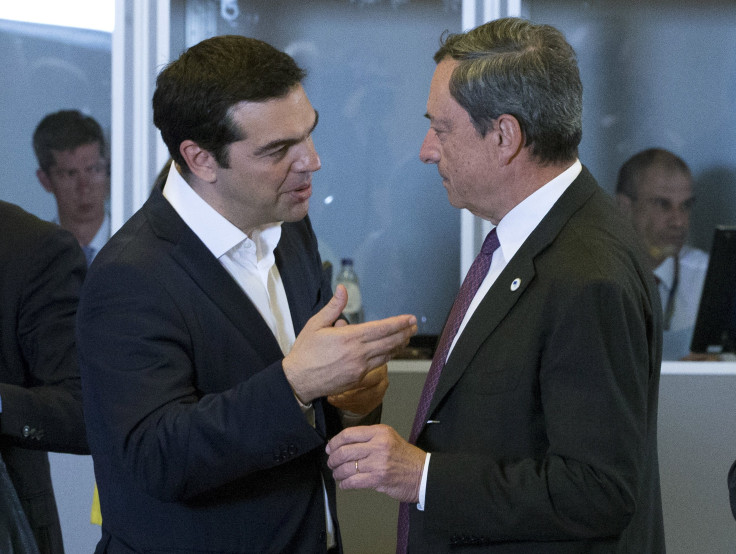European Central Bank President Mario Draghi Offers Bolstered Lifeline To Greece, Defends ECB Policy

European Central Bank President Mario Draghi said the bank raised its liquidity provision to Greek financial institutions Thursday, providing a little breathing room in advance of looming debt repayment deadlines. The eurozone’s central lender approved providing an additional 900 million euros ($979 million) to Greece’s financial system for this week, Draghi said.
The ECB’s emergency liquidity assistance to Greece has increased to roughly 90 billion euros. It had previously been frozen at 89 billion euros.
Draghi also provided an optimistic outlook on Greece’s ongoing efforts to meet its creditors’ demands through legislative reforms. Before receiving a potentially larger bailout, Greece needs a 7 billion euro bridge loan to meet upcoming debt repayment deadlines, including 3.5 billion euros to the ECB by Monday.
Greece has been in limbo since late June, when the ECB capped liquidity funding to its banks. The government in Athens responded with strict capital controls, freezing international cash transfers and limiting ATM withdrawals to 60 euros a day.
European finance ministers estimate that Greece needs at least 86 billion euros to keep its banks capitalized and debt repayments covered in the coming years. The country has reached a provisional agreement with its chief creditors to secure the bailout in exchange for passing wide-ranging fiscal measures -- including pension cuts, sales tax increases and labor and product market reforms.
The Greek government rallied to push the first of those promised reforms early Thursday after a highly charged parliamentary debate, in which the ruling Syriza party splintered over austerity measures in the reforms. Outside, protestors clashed with riot police and threw explosives.

Draghi also weighed in on the increasingly contentious conversation around providing Greece with debt relief. Greece’s prospects of winning another bailout from its eurozone and international lenders were complicated this week when the International Monetary Fund suggested it could provide lending only if Greece’s “highly unsustainable” debts were treated with some form of relief.
Draghi carefully echoed the IMF's basic analysis. “It’s uncontroversial that debt relief is necessary,” Draghi said. “The issue is what is the best form of debt relief within our framework?”
Finance ministers from hard-line countries like Germany and Finland have rebuffed Greek overtures for immediate debt relief.
Draghi responded as well to criticism that the ECB has leaned too heavily on Greece in a time of political and economic crisis. Freezing liquidity has led to hourslong ATM lines and deep financial uncertainty in Greece. But the ECB president called allegations that the bank was punishing Greece "unfounded," and assured reporters that the lender was only following its legal framework.
"We did it always acting on the assumption that Greece will be a member of the euro area," he said. "And that was never questioned."
© Copyright IBTimes 2024. All rights reserved.






















